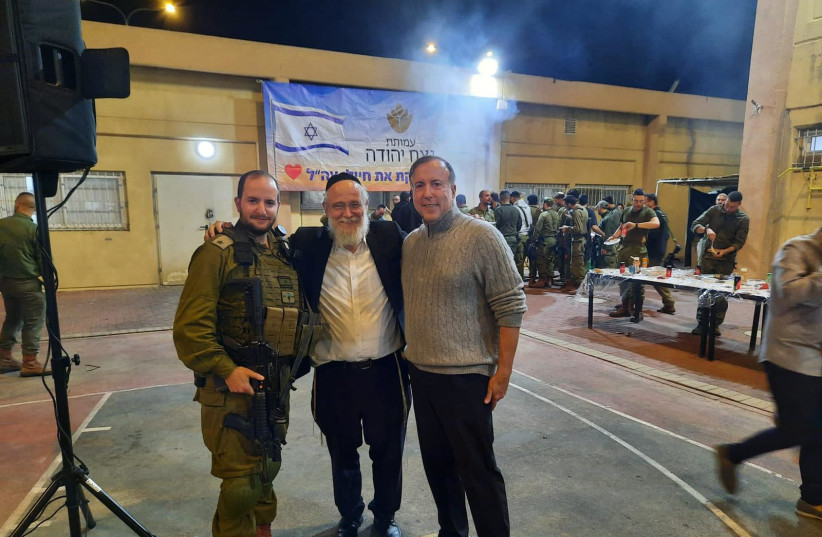Maj. (res.) Yossi Levi, CEO of the Nahal Haredi nonprofit organization and a veteran of the Israel Defense Forces (IDF), is spearheading efforts to integrate ultra-Orthodox men into the Israeli military.
While many Israelis grapple with perceptions of the ultra-Orthodox community’s dependence on the state and reluctance to enlist in military service, one of the men who is changing the reality on the ground and had the vision to enforce bringing Haredi men into the army is Levi, himself.
Levi’s military career began in the Netzah Yehuda Battalion. This unit was established by Rabbi Yitzhak Bar Haim and Rabbi David Fox in 1999 to enable Haredi men to serve as combat soldiers in an atmosphere that is strictly observant of Jewish religious law and conducive to their religious convictions.
Within Netzah Yehuda, Levi advanced to operations branch officer and later became a deputy battalion commander. He now serves as a reserve company commander in the Duvdevan undercover counterterrorism unit.
Levi was initially deployed in Gaza when the ground operation in the Israel-Hamas war began; he is currently serving in the West Bank.

Levi’s vision has led to significant changes in the enlistment of the ultra-Orthodox community, traditionally seen as reluctant to join the army. Currently, the Israeli military includes 20,000 Haredi reservists, of whom about 7,000 have been operational during the Israel-Hamas war.
Roles of Haredim within the IDF
Levi said he has met 1,000 of them himself since the start of the conflict. About 3,000 Haredim are in combat positions in the army, with the rest in the air force and noncombat roles like intelligence. Many Haredi veterans, including reservists now fighting in Gaza, hail from the Netzah Yehuda Battalion and now serve in its associated reserve battalion, Netzah Israel.
Among their responsibilities is to search for and recover the bodies of combatants and civilians, including hostages killed in Israel and the Gaza Strip, and bring them back to the military morgue at the Shura base near Ramla for identification.
Asked why he thinks Haredi men should serve in the Israeli military, Levi told The Media Line, “It’s important for the Jewish nation to have a State of Israel, and for the security of the state, you need everyone fighting,” Levi told The Media Line. Also, he said, “Security influences the economy.”
Connecting army service with economic productivity, Levy said, “As we see an increasing number of Haredim in the IDF, their participation in the economy will also grow. We need to see the values of the Torah and at the same time must remember we have a country to fight for.”
Projecting the numbers of Haredi men entering the military, Levy thinks that at least 50% should enlist, while the other half learn Torah. Currently, only 10% of ultra-Orthodox Israeli men of military age serve in the IDF.
Haredi soldiers serve the standard 2.8 years in the military, with the unique opportunity to pursue university studies during the last eight months of service. The Israeli government subsidizes their education, with many enrolled in institutions like Ariel University and the Jerusalem College of Technology, Machon Lev. This educational component is crucial in facilitating the transition of Haredi soldiers into the workforce, with Levi noting that 91% of Haredi veterans now contribute to Israel’s economy.
With the Haredi population being the fastest-growing sector in Israel, the government, including the Welfare and Defense ministries, is investing in the education of these soldiers. Many have found employment in security, computing, and legal professions. Levi emphasizes the importance of this integration, both for the military and the Israeli economy.
Levi’s approach also includes pre-army programs for Haredim. “Today we have 250 students in pre-army programs,” he said. “We want it to grow to 1,000 in five years.” He would also like to see this pre-military training start at age 16, which he believes is essential for acclimating a population not traditionally raised with the ethos of military service.
Despite the challenges, including varying perspectives within the Haredi community and the IDF itself, Levi is committed to increasing Haredi participation in the army, aiming to double their numbers in the next few years.
His goal will not only raise eyebrows in the ultra-Orthodox community but also in the army, among nonreligious soldiers. “I think some want more [ultra-Orthodox soldiers]. But some don’t want even one more Haredi unit because they are afraid this will change the army into a religious institution,” he said.
Asked when real change will come to the Haredi participation rate in the IDF and Israeli economy, he answered, “That’s the hardest question to answer,” he told The Media Line. Integrating Haredi men into the military and economy, Levi says, will require a change in the perspective of Haredi leaders—particularly the rabbis and educators in the community.
“The issue is trust and responsibility,” he says. Haredim are not accustomed to thinking of themselves as sharing collective responsibility for the wider society, a point that is felt even more acutely in times of war. “They must understand that they share responsibility for the army and the economy, and for the unity of the country.”
Regarding the participation of girls from Haredi homes in the military, Levi notes that few serve, and those who do are often no longer Haredi. Just putting on the uniform of the IDF can cause friction with their families and communities. However, a special project enables ultra-Orthodox women to work in the military as computer programmers, where they contribute without being in uniform.
Levi’s dedication to this cause stems from his own background. Educated in Haredi institutions in Jerusalem, he holds a bachelor’s degree in mathematics and computer science from the Open University. He founded the first Haredi home for lone soldiers and a combat Hesder Yeshivah, B’Tzavta, reflecting his commitment to bridging the gap between the Haredi community and wider Israeli society.
